Form Productive Habits that Stick Permanently | Small Practices
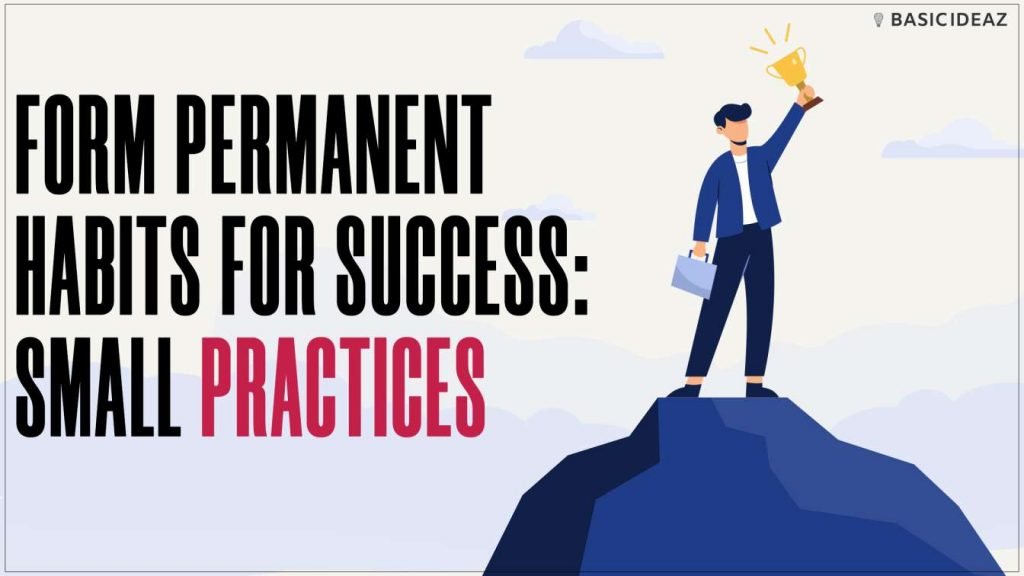
How to form productive habits?
Building habits are not easy for me because I don’t have willpower.
For a few days, I get motivated to do something, but I lose interest in it after a few days of practice.
I don’t feel like practicing anymore.
Forming new habits are for those who are always motivated towards something. I am not one of them because I don’t have any passion.
I have watched many videos on forming habits and read many articles, but nothing seemed to work.
There is no way for a person like me, who doesn’t have self-discipline can build productive habits.
***
But you can.
You don’t need self-discipline, strong willpower, or motivation to form productive habits.
Yes, it sounds too good to be true. But, the truth is, it is.
I will explain in detail, and all I want from you is to have 10 minutes of your life.
Maybe, this changes the view about human behavior, and you can reach new heights in life.
Table of Contents
Get Quality Self Improvement Articles Every Week, No Spam, No Ads.
Thank you!
You are added to the community of Basicideaz.
Introduction
My friend Roy one day decided to join the gym because he wanted to look fit and good. He always wanted to join the gym from his college days, but he kept postponing for some reason.
But, yesterday, when he saw himself in the mirror, a self-loath brew in him.
“Disgusting.” this is not the way he dreamt his life when he was a kid.
He should be physically fit, earn millions, and roam the world, but now all he can do is, sit in his office 9-6 and come home tired and dissatisfied.
The spark he had in earlier years is not there anymore.
The joy he felt in his early days has died somewhere along the way. What happened? How did he become the common man?
He always thought he was special. Life has bigger surprises for him.
But, in his early 40s, life seems incredibly tormenting.
Once, he wanted to be a screenwriter, and now it seems like a fantasy. He has buried that dream long back and carried on with his life.
But, now, his health is at stake.
If you visit Roy’s house and see his old photographs, you will think it is photoshopped.
He was 108 pounds back then, but now he has crossed 270.
His doctor says he has a high risk of heart disease and diabetes. If he continues like this, things will be terrible for him and his family.
That was enough motivation for him to join the gym.
He took a one-year membership because his journey will be longer than a year to reduce his weight.
- The first day was all exciting and did all kinds of new things people do in the gym.
- The second he couldn’t wait for the gym. He finished his work early and left the office for the workout. After the workout, he felt good about himself after a long time.
- The third day was the same. High motivation, zeal, and a strong commitment to reducing his body fat as soon as possible. It seems so easy and fun.
- On the fourth day, he took a personal coach, bought new pairs of Nike, started educating himself about losing weight and diet.
- On the fifth day, he checked his weight, 2 pounds reduced. Wow! So, he calculated that he could reach his ideal weight in just 60 days if he continues this way.
- On the sixth day, he was even more motivated than before. He became much happier, and other things in his life also seem to improve. For example, his relationship with his wife.
He was on his way to a happy life. Just by improving one aspect of his life, he started improving all the other areas.
But wait, something happened.
After three weeks, he stopped going to the gym.
He hasn’t seen the gym for the last seven months, and despite the call from his personal trainer and several warnings from his doctor, he never could persuade himself to go to the gym anymore.
Once he drove to the gym’s parking lot, but he never got out of the car.
Why should he? What was the point? He is definitely not going to come tomorrow or perhaps the day after tomorrow.
There is not just enough motivation to continue anymore.
So, why did he quit? What could be the possible reasons?
#Case 1
On the third week, when he was getting ready to go to the gym, he got a call from his old mother, who was 78 years old.
His mother’s call always makes him sad because his mother sacrificed a lot for him when he was growing up.
He made a lot of promises to his mother, which he couldn’t keep. He promised a happy life to her, but he failed.
After keeping the phone, he felt low. He didn’t want to go to the gym.
Perhaps, tomorrow I will go. I am not feeling good today. I need some rest; I am tired.
Tomorrow never came for him.
#Case 2
In the third week, his motivation has gone down. The joy and excitement he felt at the beginning
are not there anymore.
There is also slow to no progress in his weight loss. He misses the day, then the next, and concludes that he couldn’t do it because he doesn’t have enough willpower.
#Case 3
He just doesn’t feel like going that day. He worked pretty hard, and he felt he deserve a rest day. So, he ordered pizza which was getting very difficult to resist.
What is the point of living if he quits eating delicious food that he loves the most?
After eating, disgust grew inside him. He is useless, a good for nothing, couldn’t even continue his diet for only a month.
He quit the Gym.
#Case 4
Let’s assume he knew everything about habit formation. He knew that if he could form a habit of going to the gym, life would become much better.
He also knew that to form productive habits; he needs to practice them everyday. But to practice everyday, he needs self-discipline and motivation.
His motivation is going down for some reason, and he knows how his self-discipline is.
He concludes, he can’t form productive habits because he is weak.
Small practices
As the name suggests, small practice is a kind of practice that is very small in nature. It may take only a few minutes to perform any activity.
For example, writing 50 words, doing 2 push-ups, cleaning only 1 plate, practicing only 1 chord for five minutes, reading 2 pages, etc.
You have probably heard the concept of starting small whenever you are trying something new and gradually start increasing once you are comfortable.
For example, if you want to make a habit of playing the guitar, the traditional approach suggests that you should begin practicing small, like 5 minutes or less.
After two to three weeks, increase your practicing time to 10 minutes, then to 20, and eventually, after a few years, 3-4 hours everyday.

Let me tell you something about this approach: It doesn’t work with most people.
The approach requires patience and commitment for the long term.
Asking for a commitment to a person who lacks self-efficacy is like hammering the nail with one’s hand.
If we already have self-efficacy, we don’t need to read this article or watch any video.
Self-efficacy is something we are going to develop while forming new habits.
Moreover, you need high motivation for a long time to be successful in this approach. The motivation will come from the possibility that you will form this habit one day, and things will be good again.
Most of the time, the day never comes.
Motivation never lasts for long. The excitement of learning fades quickly than we know.
Again, after a certain period, the practice session will significantly increase, and with a long practice session comes the need for stronger willpower.
If you have to practice for four hours today and don’t feel like practicing, that will create a problem.
No matter how habituated you are toward a particular activity, you will not be motivated everyday.
The traditional approach’s biggest drawback is that we don’t know when to increase our practice session to have that perfect balance of learning.
Because of our impatience, most of us increase our practice session much before getting used to it and suffer later because of the burden of practice.
The traditional approach demands patience, willpower, motivation, and self-efficacy.
Small practice demands nothing like that because you never increase your practice session over the years.
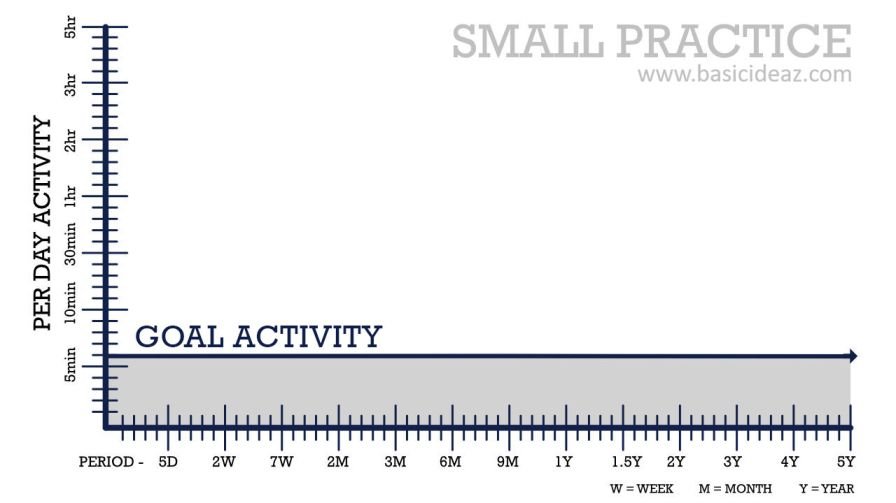
Wait, what?
I know what you are thinking.
How could you learn something by practicing only four to five minutes everyday.
A study on Habits and emotions
A study on Habits and Emotions, conducted at Texas A&M by three researchers Wendy Wood, Jeffrey M.Quinn, and Deborah A. Kashy, found that 66% of participants noticed their change in emotions by performing an action, and the rest 34% noticed their emotion to stir on their thoughts.
Once they performed an action, 2/3rd of the participant felt good to continue the action.
Only 1/3rd of the participant felt good when they thought about performing the action.
It happens with most of us.
We don’t feel like going for a workout, but our emotions change once we are there in the gym.
We feel good, motivated, and workout more than we can expect of.
Again, if we think about the benefits and end goal of practice, this sometimes makes us feel good and motivated to perform our actions.
This is short-term.
A distant end goal cannot motivate us everytime.
In small practice, you enjoy the process and not focus much on the end goal. Because once you focus on the process, the end goal emerges on its own.
For now, we don’t need to focus on the process and goal. That is a subject for another article.
The below image shows how we try to perform our activity everyday to form productive habits:
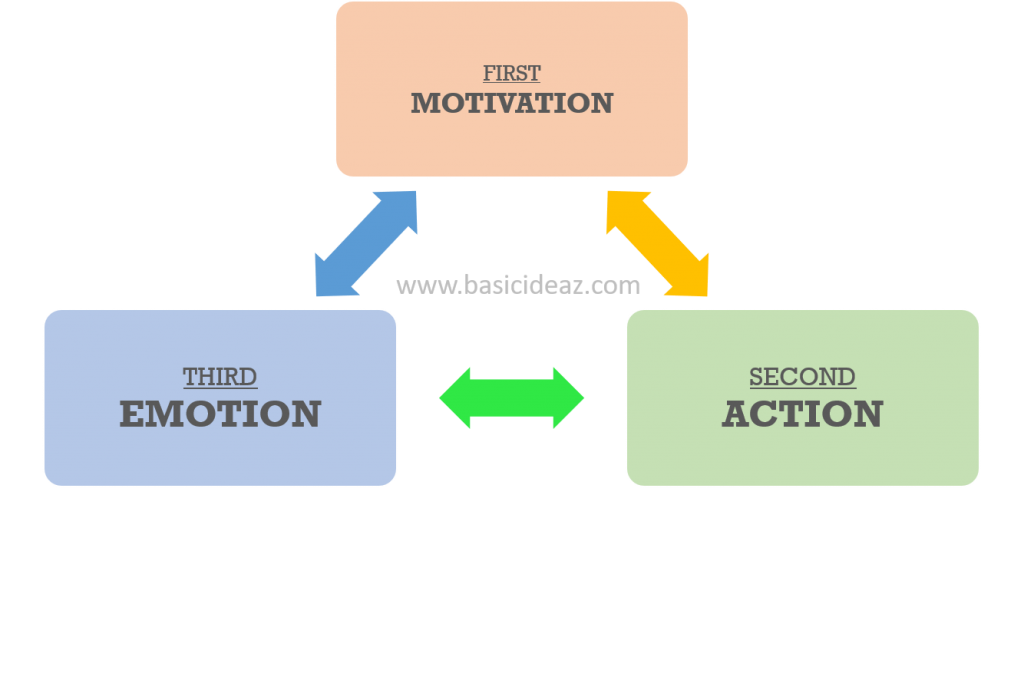
If we wait for motivation to perform our actions everyday, we can never form a habit. Motivation doesn’t show up everyday.
But, if somehow we perform the action first, without waiting for motivation, it stirs our emotions most of the time, as the study shows above, and emotion leads to intrinsic motivation.
Intrinsic motivation comes from within to pursue something, and it makes us feel good.
It creates personal satisfaction and life meaningful.
Once there is intrinsic motivation, you will perform your activity with greater focus and serenity.
The following images represent the action-oriented approach:

But how to perform an action, if we don’t feel like doing it in the first place.
Willpower & Motivation
Again you may say, I don’t have willpower. If I had, I would have formed all the productive habits.
Everyone has willpower. Only the difference between the failures and successful people is the appropriate use of it.
Small practice demands a small percentage of willpower because the tasks are so small that you don’t need stronger willpower to act.
Let me explain this will the following diagram:

The Y-axis represents motivation, and the X-axis represents willpower.
The action line represents your activity for the task.
If your task is large, like reading 50 pages, it will demand higher willpower or higher motivation to perform your action. The action line will be bigger.
Again, if your task is small, you need lower willpower and motivation.
I have mentioned “or” instead of “and” in the above statement because the relationship between motivation and willpower is inversely proportional.
If you have high motivation to perform a task, you don’t need willpower. On the other hand, if your motivation is low, you need higher willpower.
Willpower=1/Motivation
When we don’t have enough motivation nor willpower to perform a task, we fail to form a new habit.

This is why my friend Roy failed. This is why most of us fail.
Small practice demands so little of your willpower that we can do our task easily without any motivation.
Once we start our task, as mentioned above, our emotions stir, which leads to intrinsic motivation to have bonus tasks.
The below graph represents how small practice helps you to complete your everyday task.
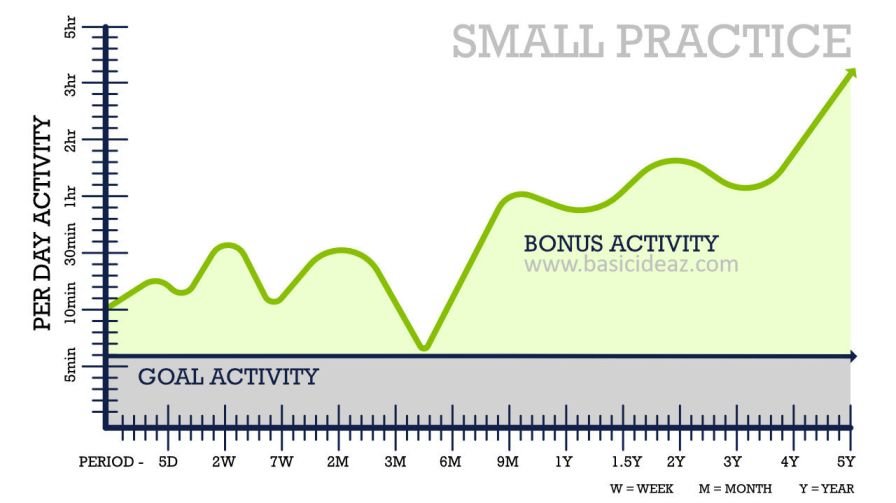
Why small practice is so effective?
In simple, small practice is so effective because it gives you a sense of completion everytime.
If your goal for today is 3 pages to read to form a habit of reading, you feel good once you complete the 3 pages.
This good feeling helps you to have bonus tasks which can go from additional 10 pages to 100 pages in a day.
B.J Fogg mentions in his book, Tiny habits that, “we can change our behavior design by feeling good and not by feeling bad.”
Small Practices make you feel good.
But, of course, there will be days, when after reading 3 pages you still don’t feel like reading more.
In those days, just give yourself a break. And most of all, by reading 3 pages, you have continued your streak.
Things to care in Small Practice
1. The biggest mistake people do in small practice is to change their goals over time.
For example, if your goal for reading 3 pages everyday changes to 50 pages after a few years after following small practice, it can be a problem.
Because if you can form productive habits, you can also break habits, knowingly or unknowingly.
Probably, you can go from 3 pages to 6 pages after a few years.
That’s how small your goal can change.
The goals of small practice depend on person to person.
For a person like me, who reads every day, my small practice goal can be 5 pages, where a person who is learning how to read can be only 1 paragraph.
2. The second biggest mistake people make to form productive habits through small practice is changing their expectations.
Once people see success in small practice, they start expecting that they will read 30 pages today too.
They say things like, my goal is 3 pages, but I expect to read 30 pages.
This is not small practice.
Your goal is 3 pages and 3 pages only. Whatever happens after that depends on the time of execution and intrinsic motivation.
Perhaps, you don’t feel like reading after completing three pages, which is okay because you already have completed the goal for today.
This mindset develops over time if you practice it everyday.
Changing expectations is natural to humans, but wise are those who know where their minds are wondering.
3. The most important point to remember in small practice is free choices. This point is so vast and complicated; perhaps this will take another article to explain.
But, lets me summarise it as best I can.
We like free choices in our life.
If we are restricted to choose or if we are compelled to choose because of someone or for our own emotions, tragedy occurs.
If we commit to not eat pizza or fatty foods for the rest of the year, we are taking all our future choices of eating fatty food.
We are only limited with the choice of not to eat fatty food.
We don’t have any freedom to choose.
It is the same as working for someone and giving him the power to control our decisions and lives.
There is no use of your freewill in case of every chance of eating fatty food.
When this occurs, our rebel nature shows up.
It doesn’t matter if the restriction of free will leads to a better life of yours. All our brains know is the confinement of our choices.
So, in small practice, we only choose for the moment.
We don’t choose for tomorrow or the next day or the whole life.
We only choose for this moment. You can choose anything in your next moment because all your future choices are open.
This kind of mindset takes time to develop, and it may not be easy to comprehend the power of free will at this time.
But, after certain practices, there will be mental clarity regarding this practice.
I will write an article on free choice and forming habits in my upcoming works.
Get Quality Self Improvement Articles Every Week, No Spam, No Ads.
Thank you!
You are added to the community of Basicideaz.
Bonus Tasks and comfort zone
Bonus tasks depend on your level of your comfort zone. If you could read 10 pages on most days as the bonus tasks, reading 20 or 30 pages is getting out of your comfort zone.
You don’t feel joy or intrinsic motivation if you are out of your comfort zone.
In simple, it is not comfortable to be outside your comfort zone for long. I guess this is why it is called the comfort zone.
Dah!
Anyways, if you use small practice at the end of your comfort zone, your zone will keep expanding.
What if you read 2 pages more after reading 10 pages everyday.
Soon, your new comfort zone will be 12 pages.
Keep breaking and expanding your comfort zone with small practice, but beware of your goals and expectations.
One last note on Addiction to form productive habits.
If you are currently addicted to social media addiction, video games addiction, pornography addiction, or substance addiction, it will be very difficult to form productive habits.
No matter what strategy you use to form good habits, you will fail over and over again.
This is because when we are addicted to something, we lose interest in all the other activities of life.
Our self-worth, self-respect, self-belief, everything goes down when are addicted to something.
We feel like slaves to our addiction, and a slave is never happy with his life.
The sense of control gives us happiness. Our personal values give us happiness.
When you are in control of your own life, your happiness surges.
Replacing addiction with good habits is a long work. It will take time and effort.
This is not an article on breaking addiction or bad habits, but I suggest you explore and take responsibility to break your addiction if you have any.
Read books, join seminars, show doctors, join rehab if you need to, do whatever you can because taking responsibility for your own problem is the first step of self-development.
Conclusion
Forming productive habits is fun and easy if you follow the small practice. You don’t need to feel guilty if you failed before because your behavior was designed unconsciously to fail.
Your behavior could be designed from early childhood experience, or wrong parenting, or wrong teachers.
Whatever the reasons are, you can change it now consciously.
You can form any habit and any behavior you like. You just need to apply the small practice in your daily life.
Try to form one or two habits in the beginning. Once you get a hold of it, go for more.
Rome didn’t got build in a day, neither your productive habits will be.
So, go out and start cultivating.
Have Fun!
Best
Ahbab


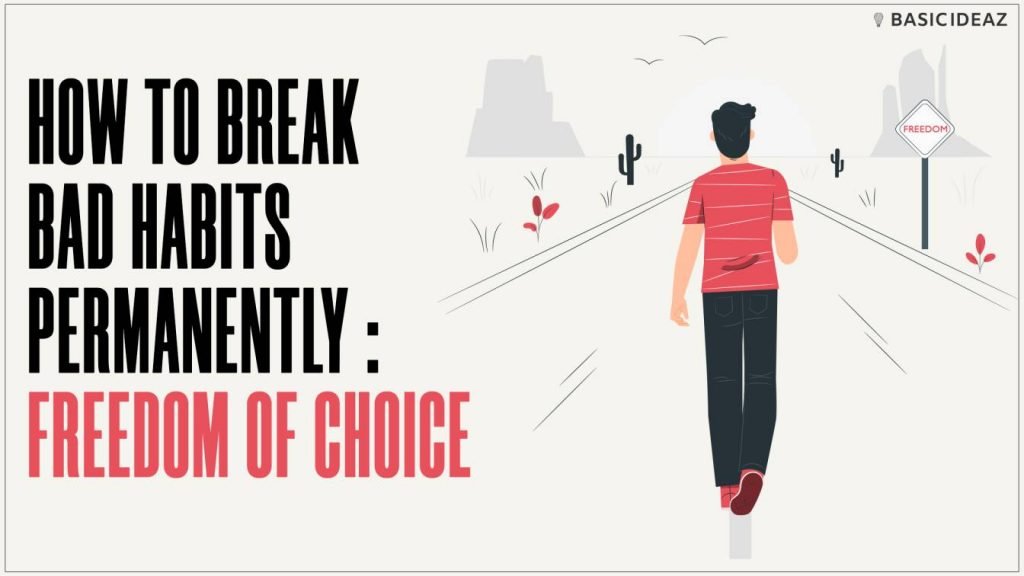


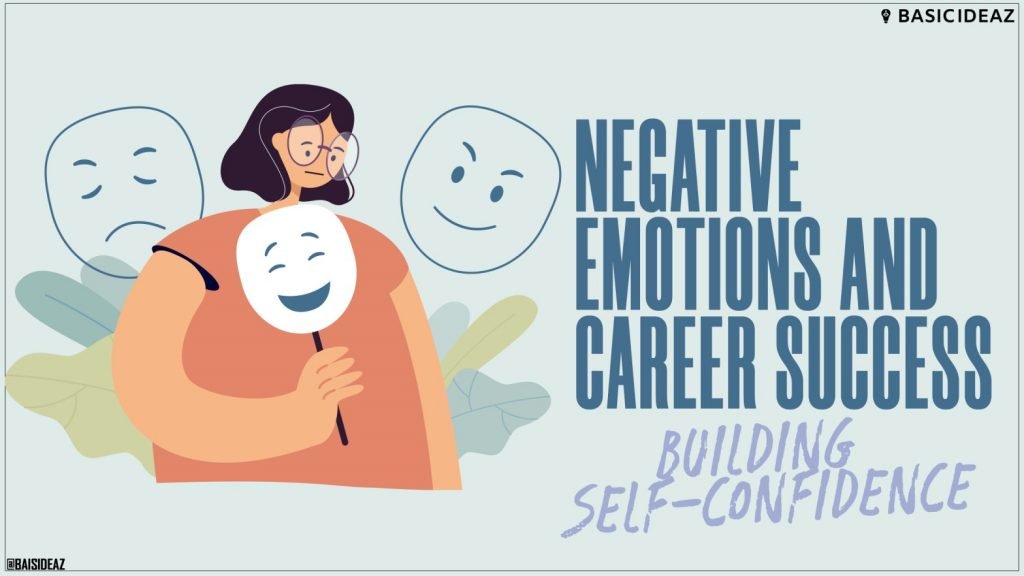
Pingback: 10 Negative Effects of Video Game Addiction | Online competitive Games. - Basic Ideaz
Pingback: How to Break Bad Habits Permanently | Freedom of Choice - Basic Ideaz
Pingback: The Path on Achieving Mastery- Beginner’s Guide. - Basic Ideaz